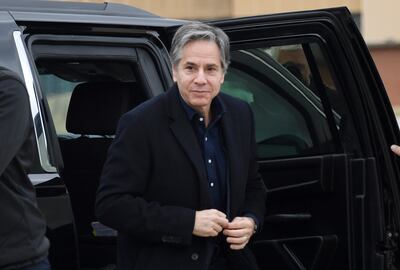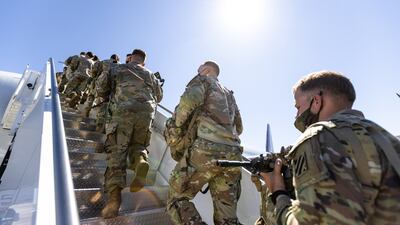Live updates: follow the latest news on Russia-Ukraine
Nato leaders are to hold an extraordinary meeting on Friday in “one of the biggest days of diplomacy” for the alliance to discuss its response to Russia’s invasion of Ukraine.
In a sign of its growing links with Scandinavia and concerns over future Russian aggression, both non-Nato members Finland and Sweden have been invited to the conference at the alliance’s headquarters in Brussels.
The conference will be led by Nato Secretary General Jens Stoltenberg along with US Secretary of State Antony Blinken and British Foreign Secretary and Liz Truss.
British officials said it would be a “landmark day of discussions” as western powers “show strength and unity in opposition to Russia’s illegal invasion”.
The focus will be on the future of Europe’s defence, which analysts have told The National has not been so threatened in decades, leading to a drastic change in the West’s approach.
“In just a few days, there’s been huge policy shifts with Europe becoming a real geopolitical actor,” said Ed Arnold, a military expert at the Rusi think tank.
“Sweden and Finland have dropped their neutrality and sent lethal aid to Ukraine. Switzerland and Ireland are no longer neutral because they're supporting sanctions against the Russian government.”
He added that Nato had for the first time had activated the 5,000 personnel in its Very High Readiness Joint Task Force.
“European security has changed more in seven days than it has in 33 years — it’s that significant,” he said.
“I think a lot of that is down to the Ukrainian will to fight and the political support that has been given because they are resisting so effectively.”

Ms Truss will meet G7 foreign ministers as well as attend the European Commission’s Foreign Affairs Council, the first UK minister to be invited since Brexit.
She will also tell them that co-operation between the UK and the EU is essential to defending European security while seeking agreement from the international community to step up support for Ukraine
“It is vital that the UK and our allies maintain a strong and united front against Russian aggression and act as one in support for Ukraine,” Ms Truss said on Thursday.
“That’s why I'm in Brussels for one of the biggest days of diplomacy. We will work with fellow freedom-loving democracies to tighten the vice around Putin’s war machine and signal our strong support for Ukraine’s territorial integrity.”
The event also shows the renewed ties between Britain and Europe following the bitterness caused by Brexit, with Ms Truss playing a leading role at the event.
British Prime Minister Boris Johnson’s official spokesman was asked if the round of visits made by Ms Truss, Mr Johnson and Defence Secretary Ben Wallace to European countries was significant in terms of renewed co-operation following Brexit.
“I think it does show that the UK is working very closely with European partners on this and that's been part of what we need to demonstrate to Putin, a strength of unity moving with purpose against the invasion of Ukraine,” he said.
Ministers will seek to reinforce Nato’s eastern flank in Poland and the Baltic States to deter Russian threats to the territorial sovereignty of member states.
They will also discuss cutting European dependency on Russian oil and gas and look for more reliable partners, the British Foreign Office said.


